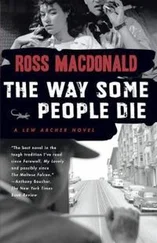Meyer’s parting smile was gentle. He didn’t believe in evil. His father had died in Buchenwald, and he didn’t believe in evil.
I DROVE ACROSS to Sunset, and up the winding road to Blackwell’s house in Bel Air. He opened the front door himself, brushing aside a little maid in uniform. His eyes moved on my face like a blind man’s eyes trying to glean a ray of light.
“You’ve found out something?”
“The news is not good.”
His hands came out and clutched both of my arms above the elbows. With the mindless automatism of St. Vitus’s dance, he started to shake me. I pushed him away.
“Calm down and I’ll tell you about it.”
“How can you expect me to be calm? My daughter has been gone for forty-eight hours. I should have used force to stop them. I should have shot him dead at my feet–”
“That’s nonsense,” I said. “We need to talk. Can we go in and sit down?”
He blinked like a man waking up from troubled sleep. “Yes. Of course.”
The drawing room he took me into was furnished with Empire pieces which gave it a museum-like atmosphere. Family portraits looked down their Blackwell noses from the walls. One of them, of an officer in the uniform of the War of 1812, had the weight and finish of a Gilbert Stuart.
Blackwell sat in an armchair under it, as if to call attention to the family resemblance. I parked myself uninvited on a red divan with a curved back, and gave him a brief rundown on my Mexican trip.
“I’ve put together certain facts I uncovered there with others that cropped up here and come to a definite conclusion about Damis. He’s a wanted man traveling under more than one alias. His real name is Bruce Campion, and he’s wanted for murder.”
Blackwell’s jaw moved slackly. I could see the pale insides of his mouth. “What did you say?”
“Damis’s real name is Campion. He’s wanted in San Mateo County for strangling his wife last spring.”
Blackwell’s face looked like cracked plaster. Consciousness withdrew from his eyes, leaving them blank as glass. He slipped from the armchair onto his knees, then fell heavily sideways. His white hair spilled like a sheaf on the old rose carpet.
I went to the door and called the maid. She came trotting and skidding on the parquetry, her excited little breasts bobbing under her uniform. She let out a muffled scream when she saw the fallen man.
“Is he dead?”
“He fainted, honey. Bring some water, and a washcloth.”
She was back in thirty seconds, half spilling a pan of water on the carpet. I sprinkled some of it on Blackwell’s face and swabbed his long forehead. His eyes came open, recognized me, remembered what I had told him. He groaned, and tried to faint again.
I slapped him with the wet cloth. The little maid stood and watched me with wide blue eyes, as if I was committing lèse-majesté .
“What’s your name?” I asked her.
“Letty.”
“Where’s Mrs. Blackwell, Letty?”
“She does hospital work one day a week. This is the day.”
“You’d better try and get in touch with her.”
“All right. Should I call the doctor, do you think?”
“He doesn’t need a doctor unless he has a heart history.”
“Heart history?” she repeated like a lip reader.
“Has he ever had a heart attack, or a stroke?”
Blackwell answered me himself, in a shamed voice: “I’ve never even fainted before.” He sat up laboriously, resting his back against the chair. “I’m not as young as I am – as I was. What you told me came as a fearful shock.”
“It doesn’t mean that Harriet is dead, you know.”
“Doesn’t it? I must have jumped to that conclusion.” He noticed the young maid standing over him. He smoothed his hair and tried to compose his face. “You may go now, Miss Flavin. Be good enough to take that pot of water with you. It’s out of place in here.”
“Yessir.” She picked it up and marched out.
Blackwell levered himself into the chair. “We have to do something,” he said unsteadily.
“I’m glad you feel that way. I’ve already alerted detectives in the Reno area. I think we should extend the search to the whole Southwest, if not the entire country. That will cost a good deal of money.”
He extended his limp fingers. “It doesn’t matter. Anything.”
“It’s time to bring in the police, too, give them all we know and build a fire under them. I suggest you start off by talking to Peter Colton.”
“Yes. I’ll do that.” He rose shakily as if the weight of his years had fallen on him all at once. “Give me a minute. My mind isn’t quite clear yet.”
“Better get yourself a drink. In the meantime, I have an important call to make. May I use one of your phones?”
“There’s one in Isobel’s sitting room. You can be private there.”
It was a small pleasant room whose French doors opened onto a private terrace. The furniture was well used, shabby rather than antique. It didn’t match the nineteenth-century grandeur of the drawing room, and I guessed that Isobel Blackwell had saved it from some less opulent period of her life – a period on which she hadn’t turned her back.
I sat at the plain oak desk, called the Hall of Justice in Redwood City, and asked the switchboard operator for Captain Royal. He was San Mateo County’s homicide chief, and I had met him on an earlier case.
“What can I do for you?” he said, after a few preliminaries.
“I have some information about Bruce Campion, who is alleged to have strangled his wife last May in your bailiwick. Is that correct?”
“Correct. It happened the night of May fifth. What’s your information?”
I heard the small click as Royal switched on his recording machine. There was a second click, that sounded like a receiver being lifted.
“I’ve been tracing Campion’s movements,” I said. “He flew from Los Angeles to Guadalajara on May twentieth.”
“The airport police were supposed to be watching for him,” Royal said impatiently.
“He used false papers and an alias – Quincy Ralph Simpson. Does that name mean anything to you?”
“It does. I found out yesterday that Simpson was icepicked in Citrus Junction two months ago. You telling me Campion did it?”
“The possibility suggests itself,” I said. “He must have been carrying Simpson’s identification when he crossed the border. Simpson was almost certainly dead by then.”
“Is Campion still in Mexico?”
“No. He spent two months there under the name Burke Damis, in Ajijic on Lake Chapala, where he was eventually recognized as a wanted man. In the meantime he’d got a visiting American girl named Harriet Blackwell to fall for him. Nine days ago the two of them flew back to Los Angeles. Campion used the Simpson alias again. Then he switched back to Damis, and spent a week as a guest in the Blackwell’s beach house near Malibu. It’s possible the Blackwell girl knows something about his past and is protecting him. Campion has her hypnotized, but she could hardly miss the change of names.”
“Is she with him now?”
“I hope not. But she probably is. The two of them left her father’s house forty-eight hours ago after a serious altercation which involved threats of shooting. They took off in her car, a new green Buick Special.” I gave him the license number.
“Who did the threatening?”
“Her father, Mark Blackwell. He’s only a retired Colonel but he has money, and I imagine he pulls weight in some circles. I’m calling from his house in Bel Air now.”
“Is Blackwell your client?”
“Yes. My immediate job is to find the girl and get her out of danger. She should be easy to spot. She’s a big blonde, short-haired, aged twenty-four, about six feet in her shoes, with a tall girl’s stoop. Expensively dressed, good figure, but face a little disfigured by a bony protuberance over the eyes. It’s a genetic defect–”
Читать дальше












